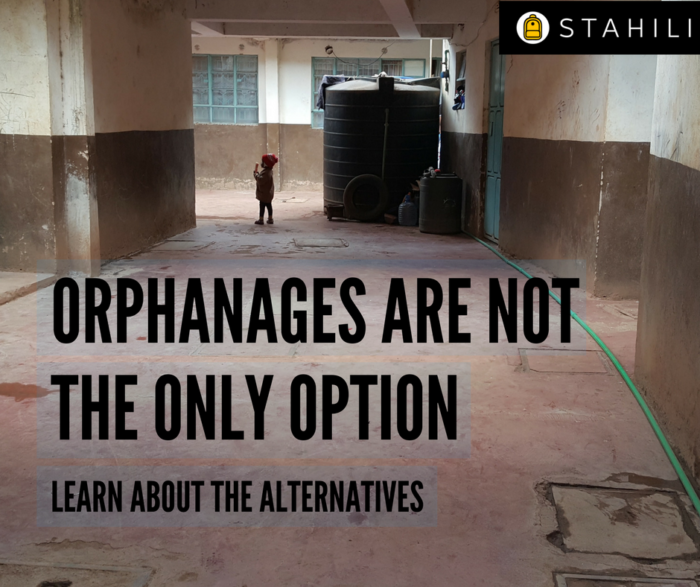10 things to know about orphanages
October 4, 2017
admin

At Stahili we are often asked about orphanages and why we believe that children should grow up in families instead. Here are ten things that you should know.
- Every child has a right to a family. Under the Convention on the Rights of the Child, every child has the right to be with their family and to be reunited with them if separated. For children without families, family-based solutions are the best alternatives to orphanages.
- No child should live in an orphanage or children’s home on a permanent basis. Under international law and the UN Guidelines on the Alternative Care of Children, orphanages and other forms of residential care institutions should be places of last resort. In reality, children often end up spending their entire childhood in such institutions. Decades of research make it clear that growing up in an orphanage can be harmful to a child’s development.
- The majority of “orphans” are not actually orphans at all. Most children (at least 80%) living in orphanages have either one or both living parents or a close relative who could care for them. In our experience at Stahili, the overwhelming majority of children who are known as “double orphans” (i.e. children who have lost both parents) have extended family who could care for them but are too poor to do so.
- Orphanages are not an appropriate, nor sustainable response to poverty. Orphanages are often used in response to poverty and neglect without addressing the underlying issues that lead to the separation of children from their families. Why put funds into long-term residential care that is harmful for children when it is possible to support the empowerment of families to enable them to care for their children?
- The number of orphanages is on the rise in many countries, even though the number of orphans globally appears to be on the decline. The rise in the number of orphanages can be attributed in great part to foreign aid and especially to what are known as “voluntourists” – usually unqualified volunteers who spend short periods of time in orphanages, often paying for the experience.
- Volunteering at orphanages causes more harm than good. Vulnerable children need the support and care of local experts who know how to support families and communities. Volunteering in and donating to orphanages has created a lucrative industry that acts as an incentive to the “orphanage business”. But even in the best of conditions and when an orphanage is not run as a business, the constant rotation of foreign volunteers is harmful to a child’s development, creating attachment issues which can greatly affect children later in life. Even children in well-meaning orphanages often have families.
- People with good intentions are fueling child trafficking. There is increasing evidence that children are being trafficked from families into orphanages to attract donations from often well-intentioned tourists and donors. This form of child exploitation has recently been acknowledged in leading reports on human trafficking.
- Most children living in residential care can become part of families. The process of reunifying children with their families has worked successfully in countries which have resolved to reduce the number of orphanages or eliminate them altogether. At Stahili, we have seen the benefits of family reunification first-hand and the positive long-term impact on children.
- There are alternatives to orphanages. Where it is not in the best interest of the child to be with his or her family, or where he or she has no one, children’s rights law and best practices in child welfare and protection confirm that alternative care, such as kinship-based care, should be established in preference to institutions.
- We cannot end orphanages without tackling the root causes of separation. Family separation is often closely linked to wider issues such as poverty, inequality, lack of access to education, and neglect. Responding to family separation means addressing these root causes as well as changing care systems. It requires interventions which empower and strengthen children, families, and communities in the spirit of the Sustainable Development Goals.
If you want to help children, make sure you support organisations which work together with families and local communities to develop sustainable solutions. Read more about our work here and consider donating to help us reunite children with their families.